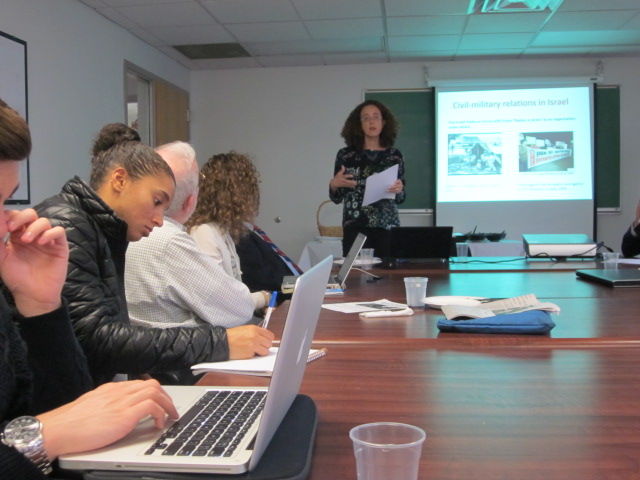
Meytal Eran-Jona, a visiting scholar at the university, spoke to about 30 faculty members and students about the Israeli military on Tuesday, Nov. 10, 2015.
As the Israel Defense Forces appear in headlines across U.S. and global news, one visiting scholar at the University of Maryland discussed Israelis’ high confidence in their military Tuesday afternoon.
During the midday lecture in Susquehanna Hall, Meytal Eran-Jona placed her audience in the Israeli public’s perspective — from those who have seen “both high-intensive conflicts and low-intensive conflicts, as well as periods of relative quiet.”
In an event sponsored by the Joseph and Alma Gildenhorn Institute for Israel Studies, Eran-Jona discussed her nine-year research into trust in military forces. She used 21,245 interviews in more than 40 surveys to determine confidence in the military during high-intensity conflicts, such as the Lebanon War, and times of relative peace.
Eran-Jona started her research-based lecture with a personal anecdote, contextualizing how national security efforts are witnessed on a daily basis. She showed a picture of a bride and groom at a wedding she attended, but recalled an alarm sounded during the ceremony.
READ MORE: Middle East issues discussed at graduate school forum
“A few weeks before the wedding, the operation in Gaza started. … The wedding was supposed to be very close to the southern part of Israel, which is very close to the Gaza Strip,” Eran-Jona said. “In those places, you have only a few seconds to find shelter.”
Eran-Jona said half of the crowd ran and half of the crowd stayed, including her. She said she watched a Gazan missile collide with one from the military’s Iron Dome defense system.
“In a democracy, it is the responsibility of the armed forces to gain the public’s trust,” she said. “A military that is not trusted by the population may have difficulty explaining its existence.”
Eran-Jona — a member of the IDF with a doctorate from Tel Aviv University — and with her colleague Roni Tiargan-Orr found that 87 percent of Israelis reported “the IDF is highly esteemed in Israeli Society” during periods of high conflict, while 76 percent reported it is held in high regard during times of relative quiet.
Eran-Jona also found that during times of high military conflict, 65 percent of respondents believed the media depicted the IDF “in a positive light.”
One insight Eran-Jona came across in her research was a dramatic dip in confidence in the military’s fighting ability in the two years following the 2006 Lebanon War. Public trust plummeted in 2007, from 80 percent confidence to 56 percent, but shot back up 21 percentage points in 2008.
READ MORE: Pro-Israel, pro-Palestine student groups to discuss recent terror abroad
“I think [the Lebanon War] was perceived as a military failure,” Eran-Jona said.
Eran-Jona’s research found that “even though the home front became the de facto battlefield, harming the civilian population on both sides, we found the rally-around-the-flag effect both in low-intensity and high-intensity conflict,” she said.
After Eran-Jona’s 45-minute PowerPoint presentation, she welcomed questions from the crowd of about 30 faculty members, professors and students. Community members asked questions about post-traumatic stress disorder, soldiers’ defection rate, whether the national draft created a bias on Eran-Jona’s positive survey results, and military sentiments among Israel’s ultra-Orthodox Jewish population.
“We tried to look at characteristics of religious women, and I don’t have the varied details yet, but one of the preliminary findings is that ultra-Orthodox Jews were a little bit less afraid,” she said.
Tomi Adeboyejo, a sophomore enrolled in a class studying the Israeli-Palestinian conflict, said she wasn’t satisfied with Eran-Jona’s reasoning for not including Arab Israelis in her polls because of the language barrier.
“I just felt like it made the research kind of biased in a sense,” said Adeboyejo, who is enrolled in letters and sciences. “I just didn’t understand why they weren’t added. Living in Israel where there are Arabs, you could have found someone to speak the language who would have been interested when it comes to the study.”
Alli Truland, a freshman philosophy major, chose to attend the lecture because she wanted to know what it was like “having military officers in public areas that aren’t supposed to be public areas and how it affects public perception of the military.”
“Even though I’ve been in religious school and summer camp all my life, and been exposed to Israeli nationalism and politics, I still know less than what I’ve learned in the past two months about Afghan politics” from class, Truland said.



